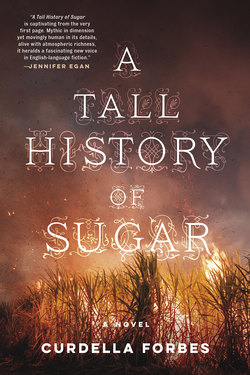Читать книгу A Tall History of Sugar - Curdella Forbes - Страница 15
На сайте Литреса книга снята с продажи.
Оглавлениеiii
He was a quick child, and read fluently from the age of two. He was wonderfully charming, and stole their hearts.
From Noah he learned the skill of making toys from scraps and waste, for Noah spent patient hours with him, showing him how to make trucks by fitting rubber strips onto the wooden wheels he carved from flotsam; how to strike a nail without bruising his hands, which Noah wrapped for him in cloth before he allowed him to hold the hammer underneath his own, guiding the small fingers; how to make and walk on stilts of cord and condensed milk tin (the stilts heaved him high in the air with his legs wide and his head up near the stars); how to make a calaban and arrange wiss-wiss to catch birds in the feeding tree.
But the child cried and would not trap the birds, and so the father abandoned this part of his teaching. The child's inability did not seem to Noah strange or unmanly, because he himself was not inclined to kill. From the day his wife brought Moshe home, he had not taken an angelfish. If they swam into his fish pots, he let them go. Their milk-blue edges reminded him too much of his son. He was exceedingly tender with the child, and if Rachel forgave him at any time for being rough and uncouth, it was whenever she saw the two of them, heads bent close together over a simple toy, Noah's bushy wild burr that to her fury he would not comb, and the toddler's strange blond bangs and tight pepper-grainy black kinks, the two heads of hair mingling as the father explained the toy's workings in low murmurs like a forest animal communing with its young.
It was from Noah that he learned the love of the sea. He listened with shining eyes as his father recounted his adventures: his vigils in the long night; the extended silences riding the waves at daylight while seabirds perched on the edge of his canoe and watched with him the great golden ball of the sun rise out of the depths; his encounters with sea trolls that he fought with a Christian cross and his lantern; the voice of the wind when he had to put up a sail; the eyes of fish gleaming in dark pools while they slept with their eyes open; the ghosts he surprised wrestling on the surface of the water, plantation people long dead fleeing their masters; his almost drowning once, in a storm, when the boat sprang a leak too wide for him to bail, and he was picked up by a passing cargo ship.
To the child hearing these tales, his father became a hero. He knew that one day he too would go to sea. He longed for it to be now.
"Dadda Noah, duu, mek mi come wid yu. Tomorrow?" Moshe begged, his widened eyes trained on his father while he sucked his thumb and comforted his navel under the hem of his vest.
"When yu big enough, yu can come wid mi."
"Mi big now." He stretched his arms out so his father could see how wide his span was, that it was like wings.
"Yu nuh so big. Wait likkle fus," Noah said, hiding a smile.
"When mi fi wait, Dadda?" Moshe's face screwed up, he was ready to cry.
"Till yu stop suck yu finger," his father said, not in a teasing voice, but gravely.
The boy came to see not sucking his finger as the mark of manhood. He knew he would not attain it for a long time to come. "Mi go stop suck mi finger," he consoled himself and his father. "An den yu go car' mi."
"Yes," his father promised, and Moshe believed him. It was enough. He waited for the day when he would no longer need his suck-finger. And though he did not know it then, it was in these communions, after tales of fishing, that the seeds were sown that later caused him to run away from home and the familiar sea.
He grew used to his father not being there all the time, though at first he cried each evening when Noah left. But it was all the life he knew, these bright Monday afternoons when his father said goodbye, these calm Thursday mornings when he came home again, bringing the sea with him; and moreover, he had his mother, with whom he spent every day of his life, and so he was not overdisturbed.
The child passionately loved his mother and father, and it grieved him that they quarreled and could not be at peace. And indeed, the story of how two people so tender-hearted married and lost each other and could not be reconciled, even with a fairy-child between them, is one of the great mysteries that can never be explained, though there was a history that might go some way toward an explanation, which later Moshe was told, and which he told me.
